Up to 25% OFF on Selected Treatments
-
Treatments
Acne and Scar
Pigmentation
Laser Hair Reduction
Dermato-surgery
Body
Anti Aging
Skin Rejuvenation
Others
- Clinics
- Blogs
Treatments
Dealing with acne during your teenage years can be challenging. It’s not just the breakouts that are hard to handle; it’s also the impact on your confidence and self-esteem. Unfortunately, many people‘s battles don’t end with the acne itself. Even after the blemishes on the face disappear, they often leave behind lasting reminders: small holes on face, depressions, and uneven skin texture that can stick around into adulthood.
These acne scars, often referred to as “acne holes” and medically known as atrophic scars, can give the skin a rough and pitted appearance. They occur when severe acne damages the deeper layers of the skin, hindering its ability to heal properly. If you have ever been curious about why these holes on the face develop, how to treat them, and what steps you can take to prevent them, you’re in the right place.
In this guide, we will cover everything you need to know about acne holes on the face—what causes them, the most effective medical treatments to smooth them out, and expert skincare tips to keep your skin clear and healthy. Let’s dive in and discover the best ways to restore your skin’s natural texture and boost your confidence!
Must Read: Everything You Need to Know About Scar Treatment and Healing
Acne scars or holes on the face form when inflamed acne lesions, like cysts or nodules, penetrate deeply into the skin, damaging the surrounding tissue. When the skin’s natural healing process is interrupted, especially during intense breakouts, it can lead to a shortage of collagen and elastin, resulting in depressed or pitted scars. This deficiency weakens the skin’s structure, leaving behind depressions or holes in the facial skin.
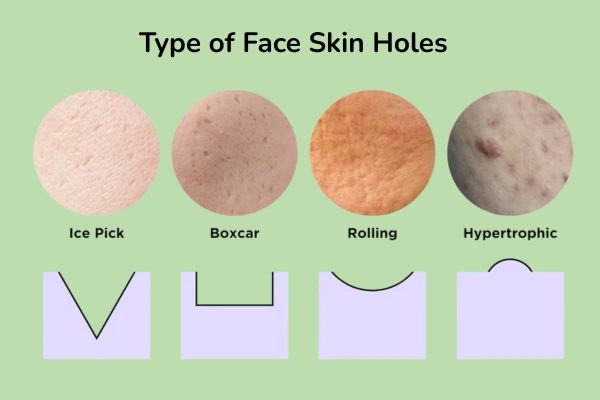
Acne scars come in various shapes, depths, and severities. Understanding its type is crucial for determining the most effective treatment. Below are the types of face skin holes based on their appearance.
Must Read: Pits on Face? Discover The Best Ice Pick Scars Treatment Options
Identifying the type of holes on your face is the first step toward selecting the right treatment for achieving smoother, healthier skin.
There are several treatments to enhance the appearance of small acne holes on the face, ranging from advanced dermatological treatments to over-the-counter skin products. However, because each skin type varies, it’s essential to consult an experienced dermatologist to identify the best treatment for your particular scars.
Here is a list of some advanced treatment solutions to reduce the appearance of small holes on the face.
Advancements in dermatology have introduced several treatment options to reduce or eliminate small acne holes on the face effectively. The choice of treatment depends on the scar type, skin type, severity of the acne hole on the face, and individual preferences. Below is the list of treatments offered at Evenly Clinic to reduce the appearance of acne holes on the face:
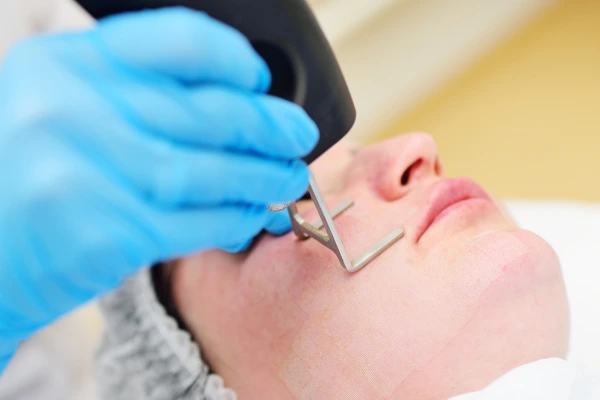
Laser resurfacing, especially fractional CO2 laser treatment, stands out as one of the most effective methods for minimizing small holes on the face caused by acne. This advanced dermatological treatment removes damaged outer skin layers while stimulating collagen production, which encourages the growth of fresh, healthy skin.
How Does Laser Resurfacing Work?
The laser treatment focuses on scarred areas, breaking down damaged tissue, and promoting skin regeneration. This process helps to:
Additionally, laser resurfacing treatment is also beneficial for reducing burn scars and surgical scars and treating hyperpigmentation and sun damage.
To achieve optimal results, multiple sessions are required, depending on the severity of the acne holes. Since laser treatments involve resurfacing the skin, it’s crucial to adhere to post-treatment care, including sun protection and moisturization, to avoid complications and ensure proper healing.
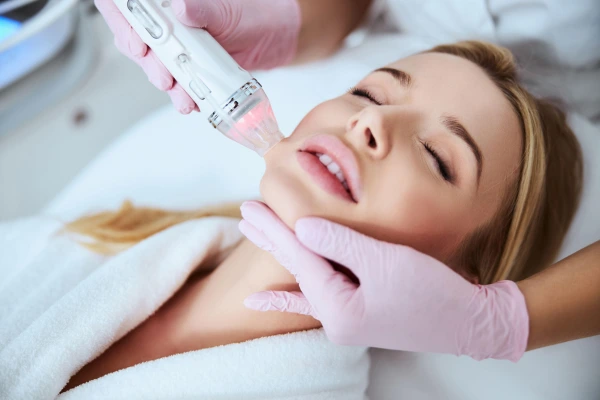
MNRF treatment is another advanced treatment solution to address acne holes on the face. It combines the benefits of microneedling by creating microinjuries in the skin that trigger collagen production and radiofrequency to penetrate deeper into the skin. It is very effective in improving skin texture and reducing the appearance of boxcars and rolling scars.
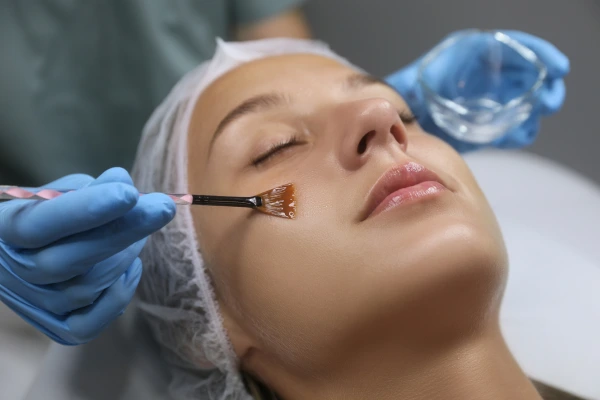
Chemical peels are a popular option for treating acne scars as they help to resurface the skin, enhance collagen production, and improve overall texture. By using a chemical solution, the outer layers of the skin are exfoliated, allowing fresh, healthier skin to come to the surface.
Types of Chemical Peels:
This method involves applying a high concentration of trichloroacetic acid (TCA) directly to the deep scars, which stimulates collagen production and helps to fill in the acne holes.
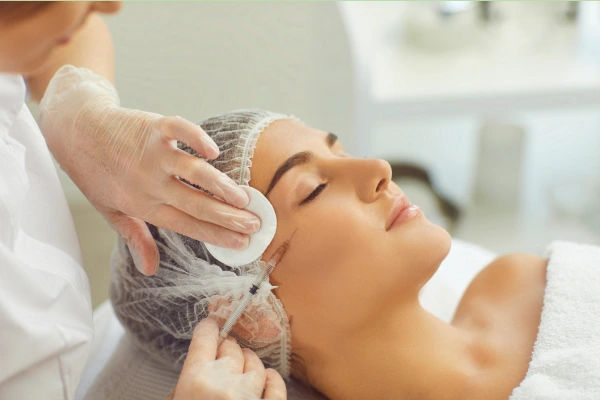
Dermal fillers, commonly used for wrinkles and face contouring, also help restore the lost volume and smooth out skin texture. At Evenly, our dermatologists use hyaluronic acid fillers to add volume to the larger holes of the skin, making it even. This treatment is best for rolling scars and depressed scars. As they are temporary, regular touch-ups are required to maintain the results. For long-term results, combining other treatments like laser resurfacing or microneedling helps enhance its effectiveness.
To effectively treat hypertrophic acne scars, our expert dermatologists use intralesional injections.
Preventing tiny holes on the face begins with effective acne management and skincare practices. Consider the following tips:
By following these guidelines, you can maintain clear skin and lower the chances of developing acne holes and scars.
Achieving and maintaining clear skin requires a combination of a healthy lifestyle and good skincare. Here is what you need to do:
At Evenly Skin and Hair Clinic, we are committed to providing exceptional aesthetic treatments that cater to your individual skincare and hair care needs. Our skilled dermatologists blend their extensive experience with the latest technology to offer safe, effective, and personalized solutions for all your concerns.
Visit Evenly Skin and Hair Clinic to discover our diverse range of treatments aimed at revitalizing your skin and boosting your confidence.
With tailored treatment plans, advanced FDA-approved technology, and a focus on patient care, we strive to ensure you receive the highest quality care for achieving healthy, radiant skin and beautiful hair.
Achieve Clearer, Healthier Skin with Expert Care
Acne scars, including deep pimple holes on the face, can be frustrating to deal with, but effective treatments are available. From microneedling to chemical peels and dermal fillers, there are multiple treatment options to improve skin texture and reduce the holes on the face. The best part is to take preventive steps to avoid the occurrence and severity of acne. We recommend consulting an experienced dermatologist who creates a customized treatment plan that delivers optimal results.
For health-related information, follow us on Instagram!!
What causes holes on the face after acne?
These holes, known as atrophic scars, occur when the skin fails to regenerate tissue following severe acne, leading to depression.
Can acne holes heal on their own?
Minor scars may fade with time, but deeper scars often need treatment for noticeable improvement.
How long does it take to see results from treatments?
The results can vary; some may see changes within weeks, while others might need several months.
Are home remedies effective for treating acne scars?
Some home remedies might work, but medically backed treatments are more effective.
Can sun exposure worsen acne scars?
Yes, UV exposure can darken scars and hinder healing; using sunscreen is essential.
Do acne scars fade over time without treatment?
Some scars may lighten on their own, but deeper ones remain without treatment.
What role does collagen play in scar treatment?
Collagen helps rebuild skin structure; many treatments focus on stimulating its production.
Are there specific skincare routines to help minimize scars?
Gentle cleansing, regular exfoliation, and moisturizing can help support skin health and scar reduction.
We hope this information is helpful. If you have any skin and hair-related questions or would like to discuss personalized solutions, please reach out to us at 7337899030. Our team of experts is dedicated to providing personalized care that meets your unique needs. Take the first step towards a healthier, more confident you by scheduling a consultation with us today. Your journey to vibrant skin and stronger hair begins here.
Book an Appointment
Start your journey to healthy skin and hair today.
Leave a Comment